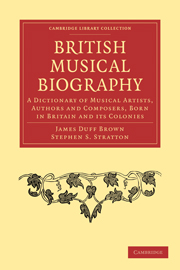 British Musical Biography
British Musical Biography Book contents
A–F
Published online by Cambridge University Press: 05 October 2010
Summary
AARON
Aaron. Scottish writer, who was consecrated Abbot of St. Martin, Cologne, in 1042. He wrote a work on chanting in public worship, entitled, “De Utilitate cantus vocalis et de modo cantandilatque psallendi.” He died in 1052.
Abbott, Rev. Henry. Writer. Was lecturer of the Church of St. John the Baptist, Bristol. Author of “The use and benefit of Church musick towards quick'ning our devotion. A sermon.” London, 1724.
Abbott, Thomas Moreton, violinist, born at Bilston, Staffordshire, August 13, 1843. Studied under Henry Hayward, of Wolverhampton. Resident for some years at Walsall; he ultimately settled in Birmingham. His repertory is large, and he is in wide demand as a soloist. As orchestral principal violin he has been associated with Mr. Stockley's orchestral concerts since 1873, first as colleague with Henry Hayward, and then with F. Ward; also, at the concerts of the Birmingham Festival Choral Society, and societies at Oxford, Wolverhampton, and other festivals. He is an accomplished violoncellist and pianist, but in these capacities restricts himself to teaching.
Abell, John, alto singer and song collector, born, probably, about 1660. In May, 1679, he became a gentleman extraordinary of the Chapel Royal, and was shortly afterwards sent to Italy by Charles II., to study music and singing. He returned to England in 1681-2, and re-entered the Chapel Royal, where he remained till 1688. He was made a Bachelor of Music at Cambridge, in 1684.
- Type
- Chapter
- Information
- British Musical BiographyA Dictionary of Musical Artists, Authors and Composers, born in Britain and its Colonies, pp. 1 - 154Publisher: Cambridge University PressPrint publication year: 2009First published in: 1897


